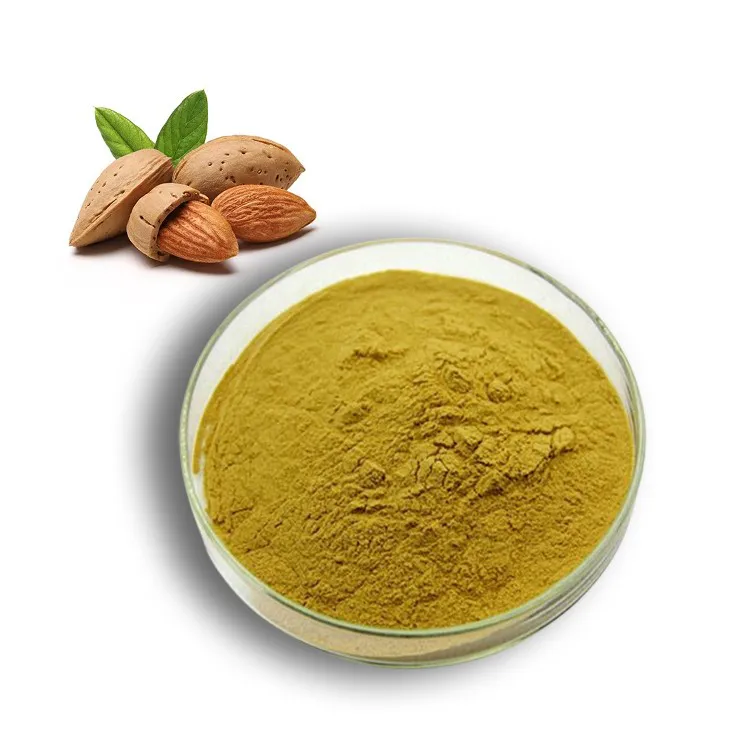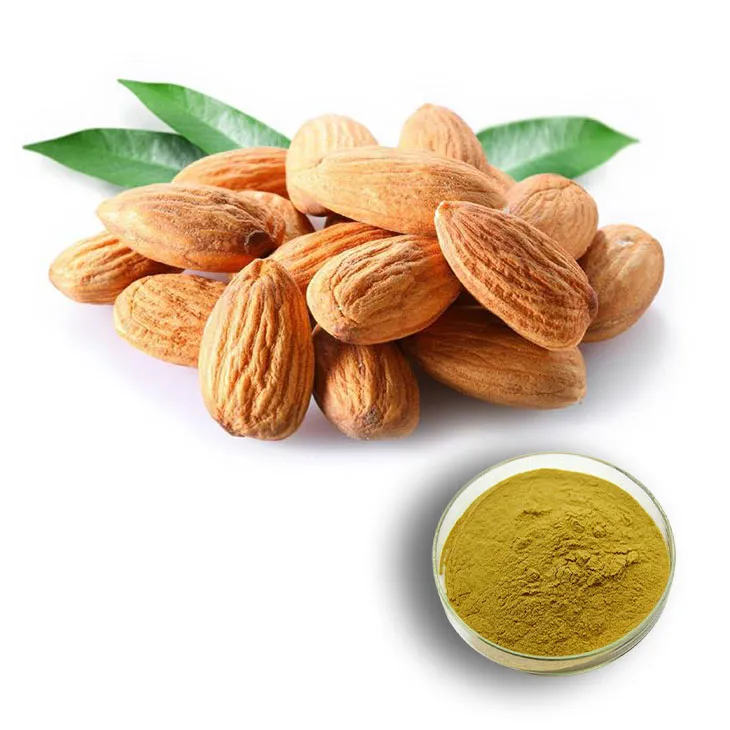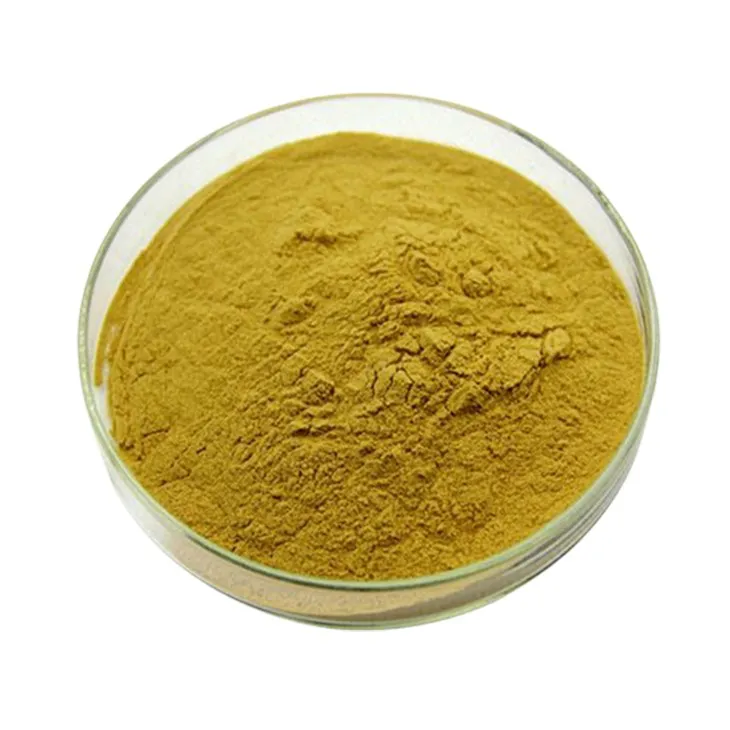- 0086-571-85302990
- sales@greenskybio.com
Almond extract powder: Uses, advantages, and manufacturing processes.
2024-11-13

1. Introduction
Almond Extract Powder has become an increasingly significant ingredient in a wide range of industries. Its popularity can be attributed to its unique properties and diverse applications. This article will delve into the various uses, advantages, and the manufacturing process of Almond Extract Powder.

2. Uses of Almond Extract Powder
2.1 In the Cosmetics Industry
The cosmetics industry has found almond extract powder to be a valuable addition to many products. Moisturizing is one of the key benefits it offers. Almonds are known for their natural oils, and when processed into extract powder, these oils can help to hydrate the skin. This makes it an ideal ingredient in lotions and creams. For example, in a high - quality moisturizing cream, almond extract powder can work in synergy with other ingredients to provide long - lasting hydration to the skin.
Another important property is its antioxidant effects. Antioxidants play a crucial role in protecting the skin from damage caused by free radicals. These free radicals are often the result of environmental factors such as pollution and UV radiation. By incorporating almond extract powder into cosmetic products, manufacturers can offer consumers a product that not only moisturizes but also helps to keep the skin looking healthy and youthful.
2.2 In the Culinary World
In the culinary realm, almond extract powder is a highly versatile ingredient. It is a common component in many sweet treats. For instance, in baking, it can be added to cakes, cookies, and pastries to impart a rich almond flavor. A classic almond - flavored cake often owes its distinct taste to the addition of almond extract powder.
However, its uses are not limited to sweet dishes. It can also be used to season savory dishes. When added to certain meat or vegetable dishes, it can add a unique depth of flavor. For example, in a chicken or vegetable stir - fry, a small amount of almond extract powder can create an unexpected and delightful flavor profile.

3. Advantages of Almond Extract Powder
3.1 Versatility
One of the most notable advantages of almond extract powder is its versatility. In both the food and cosmetics industries, it can be easily combined with other ingredients. In a food recipe, it can blend well with spices, sugars, and other flavorings. For example, in a complex spice blend for a savory dish, almond extract powder can add a touch of nuttiness without overpowering the other flavors.
In the cosmetics industry, it can be incorporated into various formulations. Whether it is a water - based lotion or an oil - based cream, almond extract powder can be adjusted to work effectively. It can be combined with other active ingredients such as vitamins, minerals, and other botanical extracts to create a product with multiple benefits.
3.2 Cost - effectiveness
Compared to using large quantities of fresh almonds, almond extract powder is a cost - effective way to obtain the almond flavor. Fresh almonds can be expensive, especially if a strong almond flavor is required in a large - scale production. Almond extract powder allows manufacturers to achieve the desired flavor intensity at a fraction of the cost. This is particularly important in the food industry where cost control is a key factor in product development and production.
3.3 Health - related Benefits
Almond extract powder may contain some of the beneficial compounds found in almonds in a more concentrated form. Almonds are a rich source of certain vitamins and minerals, and these can be retained in the extract powder to some extent. For example, almonds contain vitamin E, which is known for its antioxidant properties. When present in almond extract powder, it can contribute to the overall antioxidant capacity of the product, whether it is a food or a cosmetic.

4. Manufacturing Processes of Almond Extract Powder
4.1 Procurement of Almonds
The first step in the manufacturing process of almond extract powder is the procurement of almonds from reliable sources. Quality almonds are essential to ensure the final product meets the required standards. Almonds are typically sourced from regions known for their almond production, such as California in the United States or certain parts of Spain. These regions are known for their favorable climate and soil conditions, which result in high - quality almonds.
During the procurement process, strict quality control measures are implemented. Almonds are inspected for factors such as size, color, and absence of defects. Only almonds that meet the specified criteria are selected for further processing.
4.2 Crushing and Extraction
Once the almonds are procured, they are crushed to break them down into smaller particles. This is usually done using mechanical crushers. The crushed almonds are then subjected to extraction procedures. There are various extraction methods, but modern techniques often involve the use of solvents or supercritical fluid extraction.
Solvent extraction involves using a solvent, such as ethanol or hexane, to dissolve the flavor - containing compounds from the crushed almonds. Supercritical fluid extraction, on the other hand, uses a substance at a supercritical state (e.g., carbon dioxide) to extract the desired components. This method is often preferred as it is more environmentally friendly and can produce a higher - quality extract.
4.3 Purification
After the extraction, the resulting material needs to be purified. This step is crucial to remove any impurities that may have been introduced during the extraction process. Purification methods can include filtration, centrifugation, or chromatography. Filtration can be used to remove solid particles, while centrifugation can separate different phases based on density. Chromatography is a more sophisticated method that can separate different compounds based on their chemical properties.
4.4 Drying and Milling into Powder
Once the extract has been purified, it is then dried to remove any remaining moisture. Drying methods can include spray drying or freeze - drying. Spray drying is a commonly used method in which the extract is sprayed into a hot air stream, causing the water to evaporate quickly. Freeze - drying, on the other hand, involves freezing the extract and then removing the water by sublimation under low pressure.
After drying, the material is milled into a powder form. Milling can be done using various types of mills, such as ball mills or hammer mills. The resulting powder should have a uniform particle size and texture.
4.5 Quality and Safety Testing
Finally, the almond extract powder is tested for quality and safety before it is made available in the market. Quality tests can include checks for flavor intensity, color, and particle size distribution. Safety tests involve analyzing for the presence of any harmful substances, such as residual solvents or contaminants.
Only after passing all the required tests can the almond extract powder be sold to manufacturers in the food and cosmetics industries or directly to consumers in some cases.

5. Conclusion
Almond extract powder is a multi - faceted ingredient with a wide range of uses and significant advantages. Its applications in the cosmetics and culinary industries are diverse and valuable. The manufacturing process, which involves careful procurement, extraction, purification, and testing, ensures that a high - quality product is produced. As consumer demand for natural and versatile ingredients continues to grow, almond extract powder is likely to remain an important ingredient in various industries.
FAQ:
What are the main uses of almond extract powder in the cosmetics industry?
Almond extract powder can be incorporated into cosmetics like lotions and creams in the cosmetics industry. It has potential beneficial properties for the skin, such as moisturizing and antioxidant effects.
How can almond extract powder be used in the culinary world?
In the culinary world, almond extract powder is a staple in many recipes. It can be used to season savory dishes as well as in sweet treats, adding a unique depth of flavor.
What are the advantages of almond extract powder?
One of the main advantages of almond extract powder is its versatility. It can be easily blended with other ingredients in both food recipes and cosmetic formulations. Also, it is a cost - effective way to get the almond flavor compared to using large quantities of fresh almonds. From a health perspective, it may contain some of the beneficial compounds found in almonds in a more concentrated form, such as certain vitamins and minerals.
What is the first step in the manufacturing process of almond extract powder?
The manufacturing process of almond extract powder begins with the procurement of almonds from reliable sources.
How is the almond extract powder made?
After almonds are procured from reliable sources, they are crushed and then subjected to extraction procedures. Modern extraction techniques are used to capture the natural essence of the almond. The extracted material is then purified and converted into a powder form through drying and milling processes. Finally, this powder is tested for quality and safety before being made available in the market.
Related literature
- The Properties and Applications of Almond Extract in Food Industry"
- "Almond Extract: A Promising Ingredient in Cosmetics"
- "Manufacturing Techniques of Almond - Based Products"
- ▶ Hesperidin
- ▶ Citrus Bioflavonoids
- ▶ Plant Extract
- ▶ lycopene
- ▶ Diosmin
- ▶ Grape seed extract
- ▶ Sea buckthorn Juice Powder
- ▶ Fruit Juice Powder
- ▶ Hops Extract
- ▶ Artichoke Extract
- ▶ Mushroom extract
- ▶ Astaxanthin
- ▶ Green Tea Extract
- ▶ Curcumin
- ▶ Horse Chestnut Extract
- ▶ Other Product
- ▶ Boswellia Serrata Extract
- ▶ Resveratrol
- ▶ Marigold Extract
- ▶ Grape Leaf Extract
- ▶ New Product
- ▶ Aminolevulinic acid
- ▶ Cranberry Extract
- ▶ Red Yeast Rice
- ▶ Red Wine Extract
-
Green coffee bean Extract
2024-11-13
-
Cranberry Extract
2024-11-13
-
Purple Sweet Potato Extract
2024-11-13
-
Cassia Seed Extract
2024-11-13
-
Black Pepper Extract
2024-11-13
-
Sophora Flavescens Root Extract
2024-11-13
-
Diosmin
2024-11-13
-
Yellow Pine Extract
2024-11-13
-
Panax Ginseng Leaf Extract
2024-11-13
-
Scutellaria Extract
2024-11-13





















